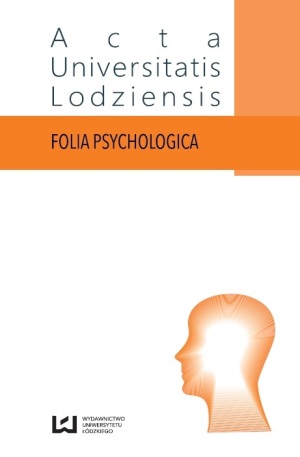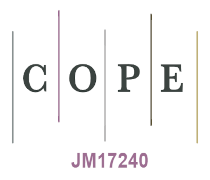Perception of marriage and family relations and coping strategies of women with different levels of depression intensity
DOI:
https://doi.org/10.18778/1427-969X.18.03Keywords:
depression, marriage, family, coping strategiesAbstract
The article concerns women suffering from depression, their marriage and family relations and coping strategies. The aim of the study was to determine if there is a relationship between a degree of depression intensity in women and the perception of their marriage, to show which coping strategies are selected by ill women, and also to establish statistically signifi cant differences between the degree of depression intensity and a level of the determined coping strategies. The correlation between the degree of depression intensity and the perception of marriage was not statistically signifi cant. However, results of some questionnaires and a survey may suggest that as a result of their depression, for a majority of the study participants there have occurred some changes in contacts with their families. On the basis of the investigations, it can be stated that women suffering from unipolar depression most often use passive coping strategies, such as blaming themselves and assuming responsibility, wishful thinking and fantasizing, looking for social support, and positive re-evaluating. The study has shown that there are statistically signifi cant differences between women with different intensity of depression as for levels of such coping strategies as looking for social support, disclosing no feelings, self-control. It is found that the greater intensity of the disorder, the more passive coping strategies are used. Positive relations with the loved ones, as well as help and support offered by them, are very important aspects in the lives of women suffering from unipolar depression.References
Bilikiewicz A. (2003). Psychiatria. Warszawa: PZWL.
Google Scholar
Brzeziński J. (2007). Metodologia badań psychologicznych. Warszawa: PWN.
Google Scholar
Dunaj-Kozłowska A. (1977). Zastosowanie Testów Niedokończonych Zdań w badaniach osobowości. [W:] J. Stanik (red.), Wybrane techniki diagnostyczne w psychologii klinicznej (s. 178– 180). Katowice: Wydawnictwo Uniwersytetu Śląskiego.
Google Scholar
Ferguson G. A., Takane Y. (2007). Analiza statystyczna w psychologii i pedagogice. Warszawa: PWN.
Google Scholar
Folkman S. (2001). Revised coping theory and process of bereavement. [W:] M. S. Stroebe (red.), Handbook of bereavement: Consequences, coping, and care (s. 563–584). Washington: American Psychological Association Press.
Google Scholar
DOI: https://doi.org/10.1037/10436-024
Gałuszka A. (2000). Dynamika poznawczego i emocjonalnego funkcjonowania osób chorych przewlekle. [W:] Heszen-Niejodek I., Jak żyć z chorobą (s. 35–37). Katowice: Wydawnictwo Uniwersytetu Śląskiego.
Google Scholar
Gwozdecka E. (2000). Poszukiwanie i unikanie informacji jako sposoby radzenia sobie ze stresem. [W:] Heszen-Niejodek I. (red.), Jak żyć z chorobą (s. 84–88.). Katowice: Wydawnictwo Uniwersytetu Śląskiego.
Google Scholar
Hammen C. (2004). Depresja. Modele kliniczne i techniki terapeutyczne. Gdańsk: Gdańskie Wydawnictwo Psychologiczne.
Google Scholar
Heszen I. (2013). Psychologia stresu. Warszawa: PWN.
Google Scholar
Heszen I., Sęk H. (2007). Psychologia zdrowia. Warszawa: PWN.
Google Scholar
Kawczyńska-Butrym Z. (1989). Partnerstwo w małżeństwie i rodzinie w sytuacji choroby. Problemy rodziny, 4, 3–5.
Google Scholar
Kępiński A. (2001). Melancholia. Kraków: Wydawnictwo Literackie.
Google Scholar
Kwiecień A., Leśniak T. (1999). Współpraca psychologiczna z rodzinami pacjentów depresyjnych w starszym wieku. Problemy Rodziny, 2–3, 6–9.
Google Scholar
Lazarus R. S. (1986). Paradygmat stresu i radzenia sobie. Nowiny Psychologiczne, 3–4 (40–41), 2–39.
Google Scholar
Loo H., Gallarda T. (1999). Depresja. Katowice: Książnica.
Google Scholar
Małkiewicz-Borkowska M., Namysłowska I. (1995). Przewlekła depresja a relacje małżeńskie. Psychiatria Polska, 6, 801–807.
Google Scholar
Namysłowska I. (1985). Życie z chorobą. [W:] W. Brodniak (red.), Społeczne problemy leczenia zaburzeń psychicznych (s. 27–42). Warszawa: PZWL.
Google Scholar
Ochojska D. (1994). Człowiek chory w rodzinie – procesy zmagania się z sytuacją. Problemy Rodziny, 6, 19–22.
Google Scholar
Ochojska D., Radochoński M. (1997). Choroba w rodzinie: style zmagania się z sytuacją trudną. Problemy Rodziny, 6, 39–43.
Google Scholar
Ogińska-Bulik N., Juczyński Z. (2010). Osobowość, stres a zdrowie. Warszawa: Difin.
Google Scholar
Papolos D. F., Papolos J. (1998). Przezwyciężyć depresję. Poznań: Rebis.
Google Scholar
Parnowski T., Jenarczyk W. (1977). Inwentarz Depresji Becka w ocenie nastroju osób zdrowych i chorych na choroby afektywne. Psychiatria Polska, 4, 417–421.
Google Scholar
Preston J. (2007). Pokonać depresję. Gdańsk: Gdańskie Wydawnictwo Psychologiczne.
Google Scholar
Pużyński S. (2009). Depresje i zaburzenia afektywne. Warszawa: PZWL.
Google Scholar
Stach R., Zięba A. (1992). Człowiek, depresja, terapia. Kraków: Secesja.
Google Scholar
Terelak J. F. (2008). Człowiek i stres. Bydgoszcz–Warszawa: Branta.
Google Scholar
Tyra T. L. (1993). Relacje małżeńskie pacjentów depresyjnych. Białystok: Filia Uniwersytetu Warszawskiego.
Google Scholar
Woydyłło E. (2012). Bo jesteś człowiekiem. Żyć z depresją, ale nie w depresji. Kraków: Wydawnictwo Literackie.
Google Scholar
Zięba A., Jawor M., Dudek D. (1996). Problematyka małżeńska pacjentów depresyjnych. Psychiatria Polska, 3, 511–520.
Google Scholar
Zięba A., Jawor M., Dudek D. (1996). Relacje małżeńskie pacjentów depresyjnych. Psychoterapia, 3, 47–53.
Google Scholar
Downloads
Published
How to Cite
Issue
Section
License

This work is licensed under a Creative Commons Attribution-NonCommercial-NoDerivatives 4.0 International License.









